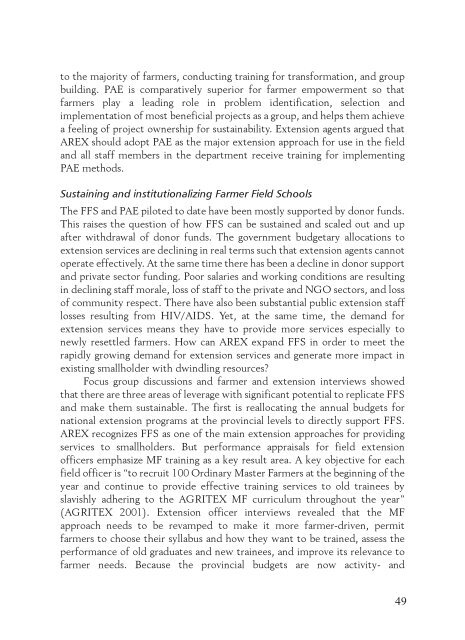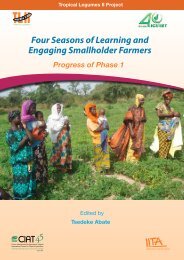Integrated Soil Water and Nutrient Management and Dry ... - Icrisat
Integrated Soil Water and Nutrient Management and Dry ... - Icrisat
Integrated Soil Water and Nutrient Management and Dry ... - Icrisat
You also want an ePaper? Increase the reach of your titles
YUMPU automatically turns print PDFs into web optimized ePapers that Google loves.
to the majority of farmers, conducting training for transformation, <strong>and</strong> group<br />
building. PAE is comparatively superior for farmer empowerment so that<br />
farmers play a leading role in problem identification, selection <strong>and</strong><br />
implementation of most beneficial projects as a group, <strong>and</strong> helps them achieve<br />
a feeling of project ownership for sustainability. Extension agents argued that<br />
AREX should adopt PAE as the major extension approach for use in the field<br />
<strong>and</strong> all staff members in the department receive training for implementing<br />
PAE methods.<br />
Sustaining <strong>and</strong> institutionalizing Farmer Field Schools<br />
The FFS <strong>and</strong> PAE piloted to date have been mostly supported by donor funds.<br />
This raises the question of how FFS can be sustained <strong>and</strong> scaled out <strong>and</strong> up<br />
after withdrawal of donor funds. The government budgetary allocations to<br />
extension services are declining in real terms such that extension agents cannot<br />
operate effectively. At the same time there has been a decline in donor support<br />
<strong>and</strong> private sector funding. Poor salaries <strong>and</strong> working conditions are resulting<br />
in declining staff morale, loss of staff to the private <strong>and</strong> NGO sectors, <strong>and</strong> loss<br />
of community respect. There have also been substantial public extension staff<br />
losses resulting from HIV/AIDS. Yet, at the same time, the dem<strong>and</strong> for<br />
extension services means they have to provide more services especially to<br />
newly resettled farmers. How can AREX exp<strong>and</strong> FFS in order to meet the<br />
rapidly growing dem<strong>and</strong> for extension services <strong>and</strong> generate more impact in<br />
existing smallholder with dwindling resources?<br />
Focus group discussions <strong>and</strong> farmer <strong>and</strong> extension interviews showed<br />
that there are three areas of leverage with significant potential to replicate FFS<br />
<strong>and</strong> make them sustainable. The first is reallocating the annual budgets for<br />
national extension programs at the provincial levels to directly support FFS.<br />
AREX recognizes FFS as one of the main extension approaches for providing<br />
services to smallholders. But performance appraisals for field extension<br />
officers emphasize MF training as a key result area. A key objective for each<br />
field officer is “to recruit 100 Ordinary Master Farmers at the beginning of the<br />
year <strong>and</strong> continue to provide effective training services to old trainees by<br />
slavishly adhering to the AGRITEX MF curriculum throughout the year”<br />
(AGRITEX 2001). Extension officer interviews revealed that the MF<br />
approach needs to be revamped to make it more farmer-driven, permit<br />
farmers to choose their syllabus <strong>and</strong> how they want to be trained, assess the<br />
performance of old graduates <strong>and</strong> new trainees, <strong>and</strong> improve its relevance to<br />
farmer needs. Because the provincial budgets are now activity- <strong>and</strong><br />
49

















